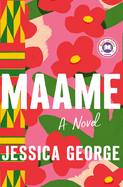
Jessica George's wry, compassionate debut novel, Maame, follows Madeleine "Maddie" Wright as she attempts to find some independence, assert herself at the publishing office where she works, deal with microaggressions from flatmates and coworkers, and maybe even find love. Maddie is used to being the responsible one. She's the dutiful daughter in her Ghanaian-British family, the one who cares for her dad as his Parkinson's gets worse and her mother spends more and more time working (and maybe doing other things) in Ghana.
"Maame," which can mean "woman" or "mother" in Twi, has been Maddie's family nickname for years, but as George's narrative opens, Maddie is beginning to resent it. She's always been a hard worker, careful with money and attentive to her family's needs. But she's tired of single-handedly dealing with her dad's care on top of her own responsibilities and resents her mother for swanning off to Ghana so often and leaving Maddie holding the bag. Her older brother, James, lives nearby, but he's usually too busy pursuing his (supposedly) high-powered career to help Maddie out, financially or otherwise. With the help of her two no-nonsense best friends, a new job at a small publishing house and a lot of late-night Google searches, Maddie attempts to reinvent herself--or simply to discover her own identity beyond Maame.
George writes with honesty and empathy for her characters, tracing Maddie's journey from insecure, anxious late bloomer to (slightly) less self-conscious twentysomething. Painfully aware that she's behind her peers in hitting a lot of the traditional milestones--first grown-up flat, first serious relationship, even first time having sex--Maddie turns to the Internet as a safe, non-judgmental space to ask her embarrassing questions. Though Maddie is intelligent and thoughtful, her anxiety about fitting in and her lack of experience often make her second-guess her own ideas and choices. Readers get an intimate glimpse into her thoughts and struggles through her Google searches, which read like a list of particular (yet universal) twentysomething concerns: What to do when you've been fired? How long do guys wait before asking a girl on a date? Is pre-date exhaustion a thing? Later, she has questions for Google about the particulars of dating: Is a first date at his house normal? Does a third date mean sex? When a family tragedy strikes, the Google searches turn somber: What are symptoms of a panic attack? How do you recover after loss?
Although much of Maddie's journey relates to her personal life, she's also dealing with career challenges--getting fired from a job she hates ("When Waterloo station approaches, I brace myself for another day at a job Google itself has deemed deserving of a bronze medal in the race to unhappiness"), then finding a new gig at a publishing house. Though she enjoys the work, navigating the office social politics proves exhausting, especially when she's usually the only Black person in the room. Readers will root for Maddie as she struggles to make her voice heard at work, while questioning whether she wants to be there at all. Her flatmates, Cam and Jo, waver between being supportive and indifferent, inviting her on a few nights out but seeming not to be too interested in her. Maddie herself, though fiercely loyal to her few close friends, isn't sure what to make of this confusing web of new social connections, especially when she finds herself attracted to Sam, one of Jo's exes who shares Maddie's thoughtful nature and her cultural background.
Despite the several meanings of "Maame" in Twi, the book delves most deeply into the ways it means "mother": both how Maddie cares for her family in an almost maternal role, and her complicated relationship with her own mother. Opinionated and loud, a devout Christian (when it suits her), Maddie's mother has strong opinions about the way her daughter should behave and the kind of man she should bring home. Part of Maddie's journey into adulthood is learning to stand up to her mother and learning to recognize the ways in which the label "Maame" has become a straitjacket she'd prefer to escape. George portrays Maddie's family members with compassion; even James has his own struggles that he's hesitant to share with Maddie. Later in the book, Maddie and her mother are able to have several honest (if still frustrating) conversations about their relationship and the things Maddie is learning about herself.
Full of dry humor and entirely relatable moments, Maame is a warmhearted, often hilarious account of one woman's journey through her awkward yet exciting 20s. Readers will root for Maddie to find self-confidence and happiness, both at work and in her personal life. As she deals with personal finances, flatmate issues, joy, grief and even figuring out what she likes to eat, Maddie is gradually getting to know herself. George's narrative is a tribute to all women who make the effort--no matter how difficult or confusing--to take control of their own lives. --Katie Noah Gibson

